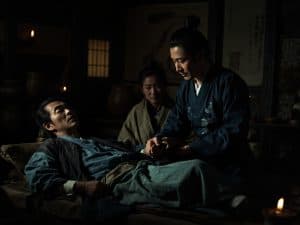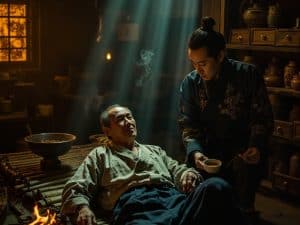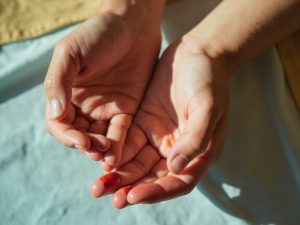Table of Contents
ToggleTraditional Chinese Medicine Case Analysis2:Fever, Chest Pain, Frequent Palpitations and Fright, Insomnia, Delirium, Disorientation, Muscle Tremors and Twitches
Author: Gu Yuxi Editor: Gu Yuxi Translator: Gu Yuxi
Traditional Chinese Medicine Case Analysis from Shang Han Jiu Shi Lun by Xu Shuwei (Song Dynasty) – Muscle Tremors and Twitches (Case Seventeen)
Original Text:
xiang li shi ren xing jing. yu sheng wei ye. wei zhi jing sheng zi. qi zi nian jin san shi. chu de bing. shen wei han. mai ruo. e feng. yi zhe wu yi ma huang tang han zhi. han sui bu zhi. fa re. xin tong. duo jing ji. ye jian bu de mian wo. zhan yu. bu shi ren. jin ti rou run. zhen zhen dong yao. yi zhe yi zhen xin jing feng yao zhi zhi. yu shi zhi yue. qiang han zhi guo ye. zhong jing yun mai wei ruo. han chu e feng zhe. bu ke fu qing long tang. fu zhi ze jin ti rou. ci wei ni ye. wei zhen wu tang ke shou zhi.
zhong jing yun tai yang bing fa han. han chu bu jie. qi ren reng fa re. xin xia ji. shen run dong. zhen zhen yu pi di zhe. zhen wu tang zhu zhi. yu san tou er da bing chu. ci yi qing xin wan zhu ye tang jie yu du. shu ri chai.
Translation:
There was a man from the countryside, surnamed Jing, who made a living selling ropes and was nicknamed “Jing Ropes.” His son, nearly thirty years old, initially presented with slight sweating, a weak pulse, and an aversion to wind. A doctor mistakenly prescribed Ma Huang Tang (Ephedra Decoction) to induce sweating. As a result, the patient began to sweat incessantly, developed a fever, experienced chest pain, frequent palpitations, insomnia, delirium, inability to recognize people, muscle twitching, and dizziness with a sensation of impending collapse.
The doctor planned to prescribe medications to calm the heart and stop convulsions. I looked at him intently and said, “This condition was caused by your excessive use of Ma Huang Tang to induce sweating.”
I then referenced Zhong Jing’s (Zhang Zhongjing’s) teachings: “If the pulse is weak, and there is sweating with an aversion to wind, Qing Long Tang (Blue Dragon Decoction) should not be administered. If administered, it will lead to muscle twitching and tremors; this is a contraindication.” In this specific situation, only Zhen Wu Tang (True Warrior Decoction) could reverse the condition. I further quoted Zhong Jing: “For Taiyang disease with sweating, where sweating does not resolve the condition, and the person still has a fever, epigastric palpitations, body tremors, and feels as if they are about to collapse, Zhen Wu Tang is indicated.”
I prescribed Zhen Wu Tang, and after three doses, the patient’s condition largely improved. To clear the remaining minor heat toxins, I then used Qing Xin Wan (Clear the Heart Pill) and Zhu Ye Tang (Bamboo Leaf Decoction). A few days later, the patient made a full recovery.
【Traditional Chinese Medicine Syndrome Differentiation Approach】:
Differentiating Six Syndromes:
- Difficulty with urination: None.
- Taiyang disease: Possible. Fever. There should also be aversion to cold, indicating the exterior was not resolved.
- Yangming disease: Possible. Delirium, disorientation.
- Shaoyang disease: None.
- Shaoyin disease: Present. Incessant sweating, inability to sleep at night.
- Taiyin disease: None.
- Jueyin disease: None.
Differentiating Miscellaneous Syndromes:
- Qi deficiency: Present. Chest pain, frequent palpitations and fright.
- Blood deficiency: None.
- Water-fluid retention: Present. Muscle tremors and twitches, shaking and swaying.
- Retained food: None.
- Phlegm obstruction: None.
- Blood stasis: None.
- Other miscellaneous diseases: None.
Summary:
Breaking it down this way, it can be confirmed that this patient has Shaoyin disease, water-fluid retention, and Qi deficiency (due to Yang depletion caused by excessive sweating). Other suspected Taiyang and Yangming symptoms are, firstly, uncertain, and secondly, according to the priority of treatment principles, they are not to be addressed first.
Based on the treatment principles:
- For Yang deficiency, support Yang first.
- If both exterior syndrome and water-fluid retention are present simultaneously, address water-fluid retention first.
- Fluid deficiency also requires nourishing fluids.
Therefore, Zhen Wu Tang is the only suitable prescription.
Shang Han Za Bing Lun Clause Corresponding to this Traditional Chinese Medicine
Case:
Differentiation and Treatment of Taiyang Disease (Middle) 7.55: “For Taiyang disease, if sweating has been induced, but the fever persists despite sweating, and the patient experiences palpitations below the heart, dizziness, body twitching, and a trembling sensation as if about to fall or collapse, Zhen Wu Tang is indicated.”
This clause’s “Taiyang disease, if sweating has been induced, but the fever persists despite sweating, and the patient still has fever” corresponds to the case’s “physician mistakenly treated him with Ma Huang Tang to induce sweating. Consequently, the sweating became incessant, accompanied by fever.” The clause’s “palpitations below the heart, dizziness, body twitching, and a trembling sensation as if about to fall or collapse” corresponds to the case’s “frequent palpitations and fright, muscle tremors and twitches, shaking and swaying.” Most of the main symptoms here align with the symptoms in this clause. The remaining symptoms—chest pain, inability to sleep at night, delirium, disorientation—some can be incidentally resolved by Zhen Wu Tang, while others were cleared with Qing Xin Wan and Zhu Ye Tang in the case.
Hu Xishu’s Interpretation of this Clause:
This arises from inducing sweating. “Taiyang disease with sweating,” refers to a person who originally had difficulty with urination and internal water retention. If you do not promote diuresis and only induce sweating, it will not work. This clause explains this principle, which is why the exterior is not resolved despite sweating.
“The patient still has fever” means the exterior is not resolved, so fever persists. “Palpitations below the heart” means water rebels and fills below the heart, causing palpitations. “Dizziness” means water qi rushes upwards, causing dizziness in the head. “Body twitching” means twitching, or muscle or sinew spasms on the body. “Muscle tremors and twitches,” these are all signs of deficiency.
“Shaking and trembling as if about to fall or collapse,” “shaking and trembling” indicates shivering, and “about to fall or collapse” means they are about to fall down. This indicates that not only is the exterior not resolved, and water not expelled, but the condition has instead sunken into extreme deficiency, entering a cold-Yin syndrome. “Shaking and trembling” means shivering, as mentioned earlier, “due to deficiency.”
Zhen Wu Tang is also a formula that promotes urination, but it is beneficial for Yin deficiency syndromes. It is a deficiency syndrome within a Yin syndrome. Where does it come from? All due to difficulty with urination, with internal water retention, which was mishandled by inducing sweating.
Looking at Zhen Wu Tang as a whole, it can not only treat conditions like difficulty with urination, shivering, muscle twitching, and feeling like falling, but also treat situations with internal fluid retention, a mechanism of diarrhea, and abdominal pain. It also treats water qi below the heart, but these are all sunken into Yin deficiency syndromes. Clinically, we encounter patients with severe aversion to cold, especially those with “shaking and trembling as if about to fall or collapse,” shivering. Shivering is always a reflection of Yin deficiency syndrome.
Therefore, when there is internal fluid retention and sweating is induced, various transformations can occur. You see, palpitations below the heart, body twitching and moving, shaking and trembling as if about to fall or collapse—all these are such cases. It is essential to promote urination, especially when difficulty with urination is present alongside exterior symptoms. It is imperative to promote urination to resolve the exterior; using general sweating methods is absolutely not permissible.
Zhen Wu Tang Formula:
Source: Shang Han Za Bing Lun
Ingredients:
- Fu Ling (Poria) 3 liang (approximately 90g)
- Shao Yao (Peony Root) 3 liang (approximately 90g)
- Sheng Jiang (Fresh Ginger) 3 liang (sliced) (approximately 90g)
- Bai Zhu (White Atractylodes Rhizome) 2 liang (approximately 60g)
- Fu Zi (Prepared Aconite Root) 1 piece (prepared, peeled, broken into eight pieces)
Preparation: The above five ingredients, with eight sheng (approximately 8 liters) of water, are boiled to yield three sheng (approximately 3 liters). Remove the dregs. Take seven ge (approximately 700ml) warm, three times a day.
Hu Xishu’s Dosage:
- Fu Ling: 9g
- Shao Yao: 9g
- Sheng Jiang: 9g
- Bai Zhu: 6g
- Pao Fu Zi (Prepared Aconite Root): 15g
Hu Xishu’s Formula Indications:
One type originates from Taiyang disease, but due to the exterior not resolving, there is internal water retention, with water filling and rebelling below the heart, causing palpitations below the heart. Water qi rushes upwards, causing the head to spin – dizziness. Muscles or sinews on the body twitch – body twitching. Shivering, as if about to fall down – shaking and trembling as if about to fall or collapse. These are mostly syndromes that have sunken into extreme deficiency and entered cold-Yin. Zhen Wu Tang is also a formula that promotes urination, but it is beneficial for Yin deficiency syndromes, specifically deficiency syndromes within Yin syndromes.
Another type falls within the framework of Shaoyin disease. As long as there are symptoms of abdominal pain, difficulty with urination, heavy and painful limbs, and spontaneous diarrhea, Zhen Wu Tang can be used.
The herbs in Zhen Wu Tang are: Fu Ling, Shao Yao, Sheng Jiang, Bai Zhu, and Fu Zi. Fu Ling and Bai Zhu are diuretics. Sheng Jiang is used because water rebels upwards, sometimes causing nausea; the dosage of Sheng Jiang is quite heavy, 3 liang. So, Sheng Jiang is included to treat palpitations below the heart. Zhen Wu Tang might cause nausea, as we can analyze from the formula. Zhen Wu Tang includes Shao Yao, as water sinks into a Yin syndrome, and there might also be abdominal pain; Shao Yao treats abdominal pain. Additionally, because it has sunk into a Yin deficiency syndrome (a deficiency syndrome within a Yin syndrome), there is shivering and severe aversion to cold, necessitating the inclusion of Fu Zi.
Disclaimer:
The experiences and insights shared above represent the author’s personal usage and understanding, and are provided for reference only as part of academic exchange. Please do not blindly replicate or apply them; any consequences arising from such actions are solely your responsibility. As individual constitutions vary, medication should be tailored accordingly. It is advisable to use such treatments under the guidance of a qualified physician. If you have additional experiences to share, comments and submissions are welcome.
If you appreciate my article, please give it a like.
If you are a generous and affluent individual, please consider making a donation!
Your recognition is my greatest motivation to continue writing—thank you very much!
USD Donation Button —
A RMB donation button is available below.
 微信赞赏
微信赞赏 支付宝赞赏
支付宝赞赏




